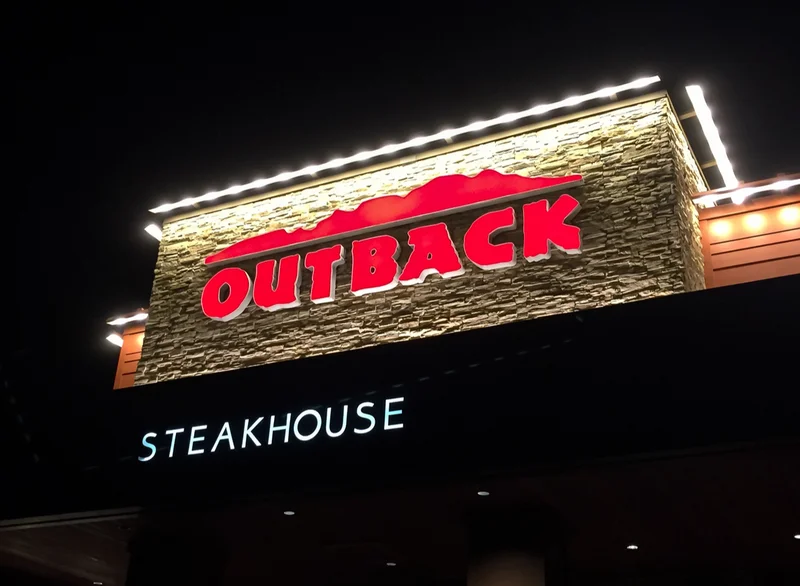BTC Signals Pro | Bitcoin Trading Alerts & Market Insights
BTC Signals Pro | Bitcoin Trading Alerts & Market Insights
Okay, let's talk Outback Steakhouse. Closures, lease non-renewals, suspended dividends—it sounds like a recipe for disaster, right? Bloomin' Brands, Outback's parent company, is taking a $33 million impairment charge, which is never a fun headline. But before we write them off, let’s look at the bigger picture. They're not just throwing in the towel; they're doubling down with a $75 million investment in a turnaround plan, and that, my friends, is where things get interesting.
Outback has been struggling, sure. CEO Mike Spanos acknowledges this, but he also sees the brand awareness as a huge opportunity. They know people know Outback, they just need to give them a reason to go to Outback. So, what's the plan? It's multi-pronged. New menus highlighting improved steaks (yes, please!), increased value offers (always a good move), and a complete restaurant renovation.
Think about this: every single remaining Outback restaurant—all 670 of them—will be renovated by the end of 2028. Brighter interiors, newly designed bars and seats, smaller kitchens, and expanded pickup areas. It’s a full-scale makeover. It’s not just about slapping on a fresh coat of paint; it’s about rethinking the entire dining experience.
And there’s more. They're also reducing the number of tables waiters serve from six to four. This might seem like a small detail, but it's a game-changer. More attentive service, a more personalized experience—it’s a direct response to diners who are becoming more selective, who are demanding better value for their money.
This is where the analogy comes in. It reminds me of Apple in the late 90s. On the verge of collapse, they streamlined their product line, focused on design, and doubled down on user experience. Could this be Outback's "Think Different" moment? Can they recapture the magic and become a dining destination again?
Now, some might say this is a desperate move. Bloomin’ Brands stock has lost 40% of its value since the beginning of the year, after all. And yes, suspending the shareholder dividend is a tough pill to swallow. It's worth noting that Outback’s parent company abruptly closed 21 restaurants - CNN. But sometimes, you have to take drastic measures to survive and thrive.

The question is, can they pull it off? Can they convince diners that Outback is more than just a nostalgic relic of the past? Can they compete with the likes of LongHorn Steakhouse and Texas Roadhouse, who are already posting impressive sales growth?
Here's what I find fascinating: Outback actually posted a 0.4% rise in same-store sales this quarter. It’s not a huge jump, but it’s a start. It's a sign that maybe, just maybe, the turnaround plan is already starting to work.
What if this is the beginning of a new era for Outback? What if this $75 million investment is the catalyst that sparks a resurgence? Imagine Outback becoming a leader in the casual dining space once again, not by clinging to the past, but by embracing the future.
Of course, there are risks. Consumer tastes are fickle, and the restaurant industry is fiercely competitive. But Bloomin' Brands is betting big on Outback, and I, for one, am excited to see what happens next. This is the kind of bold move that can either be a spectacular failure or a triumphant success, and honestly, I'm rooting for them. This is the kind of comeback story that reminds me why I love analyzing the business world.
One thing that is missing is why they are making these changes now. What data led them to believe that smaller kitchens and expanded pickup areas are the key to success? Are they seeing a shift in consumer behavior towards takeout? Details on the decision-making process are scarce, but the direction is clear. They are betting on a future where convenience and experience coexist.
The real question is, will people embrace the new Outback? Will they see it as a genuine attempt to improve, or will they dismiss it as a desperate attempt to stay relevant? The answer, I suspect, lies in the execution. If they can deliver on their promises of better steaks, better service, and a better overall experience, then I think they have a real shot at turning things around.
This isn't just about saving a restaurant chain; it's about the power of reinvention, the courage to take risks, and the belief that even the most iconic brands can adapt and thrive in a changing world. I'm optimistic because I see a company willing to learn, willing to invest, and willing to fight for its future. And that, my friends, is a recipe for success.